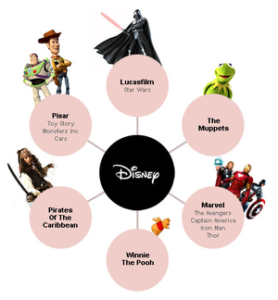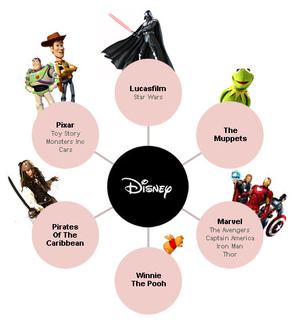Favor the Franchise
If you pay attention to Hollywood today, you have probably noticed that western civilization is in the latter stages of spiritual and intellectual degeneration. You will also have noticed, by the by, that most of Hollywood’s output these days consists of (a) franchise movies, (b) movies based on pre-existing cultural artifacts, such as books, comics, other movies, theme park rides, and decades-old Disney cartoons, and (c) franchise movies based on pre-existing cultural artifacts like books, comics, etc. The percentage of such derivative works in Hollywood’s modern oeuvre has been estimated to be as high as 99 percent, but it might be as low as 96 percent.
So Hollywood is not terribly original these days. But the reliance on franchise is not a phenomenon isolated in Hollywood. The adventuresome reader seeking out a new book by a new author must be careful – careful that he doesn’t end up picking book 3.25 in an eleven-book series, finale coming out next spring. (By the way, decimal books: a thing.) (Decimal movies, too.) It is possible, with sequels and spin-offs and a faithful public, to make an entire career of one story. A standalone book is an increasingly rare bird.
 Movie studios favor the franchise for the same reason that book publishers do: money. It must be admitted that this is a sensible reason, particularly in the case of movie studios. When you’re pouring out money in the tens of millions for a single film, you want a sure thing. How do you know people will like your newest project? Well – they liked the last one, didn’t they? It is a well-worn axiom that the sequel is never quite as good, but that does not prevent the sequel from inheriting the audience of its predecessor.
Movie studios favor the franchise for the same reason that book publishers do: money. It must be admitted that this is a sensible reason, particularly in the case of movie studios. When you’re pouring out money in the tens of millions for a single film, you want a sure thing. How do you know people will like your newest project? Well – they liked the last one, didn’t they? It is a well-worn axiom that the sequel is never quite as good, but that does not prevent the sequel from inheriting the audience of its predecessor.
That truth brings us to another significant fact: People do not seem to easily tire of the franchise. Publishers and studios are looking for a profit, and audiences give it to them. Diminishing quality ultimately ends in diminishing financial returns, perhaps even in the death of the franchise – but along that road a great deal of money is given up to mediocre and even poor installments. Franchises depend on the powerful attraction of effective stories. You never want your favorite story to end, and the characters who have inspired more emotion than half of the real people you know – it is hard to let them go. The desire for the story to go on, the curious attachment to non-existent people, sustains the franchise.
And yet maybe it all is a little too much. Beyond the bankruptcy of individual franchises, we have been trained to a certain insouciance regarding the endless sprawl of connected films. Of course they’re making a sequel. There is, too, a downgrading of regard for those who seem too inclined to revisit old triumphs; Pixar toppled from the creative heights when it discovered the sequel, and no one counts on Pixar’s annual offering being one of the film highlights of the year anymore. This, then, is what I would like to know: Does the paying public want more standalones and more variety, or are we content with franchises as long as they are well-maintained?












































I for one like stand-alone stories like Gattica better than franchises like Star Wars. But I do watch both.
I personally enjoy both watching and writing franchises, because like you said, I like the characters. But there is a certain charm to a stand alone.
I love franchises, but when people milk them too hard they run the risk of ruining them. Sometimes they might shorten the deadlines between releases too much, for instance, which means that the writers have less time to write the stories as well as they should. Deadlines aren’t the only issue, but I appreciate it when people put a lot of effort into making every part of the franchise good, instead of rapidly cranking out sequels for money.
The thing about franchises is that it helps cultivate a fandom that viewers can get immersed in. Those fans are more likely to buy merchandise, or write fanfiction and keep people excited about a story for a long time to come. That increases fan enjoyment and gives the story a deeper meaning.
When it comes to franchises, what I like to see is good world building and characterization, and then have all the sequels and associated series be a continuation that comes naturally and that fans long for. With Naruto, for instance, there is a very large and immersive world. And, at the end of the first Naruto series, there was still tons of room for character growth and world exploration. At the end of the first series, Sasuke was still a revenge driven rogue, and the sequel, Naruto Shippuden, was spent trying to redeem him and navigate the dark politics that affected the world up until then. The Naruto franchise is far from perfect(the anime has lots of annoying filler episodes) but they do a pretty good job of making fans care about the characters. They really need to work on making the Boruto series(the sequel to Naruto Shippuden) better, though.
The Fate series is another example of a story universe that has a good model for franchises. It has a great premise, and the secret world of mages and legendary heroes it presents has a lot of good lore to it. It’s already established that there have been many wars for the Holy Grail, along with interesting things around the Grail Wars’ origins, so the franchise owners only need to explore those. They’ve already started doing that, and the newer Fate Stay Night show (Unlimited Blade Works, I think) was fairly decent. Other than that, though, I haven’t seen enough of the sequels to say how well they’ve done.
The Warriors series seems to be a franchise that has gone a bit more poorly, though. There’s tons of great worldbuilding in it, but from what I understand, multiple authors work on that series, and often under short deadlines. From a lot of the complaints I hear from fans, it sounds like the authors tend to just crank them out because it’s their job, rather than having time to handle the story the way they need to. Fans have pointed out tons of obvious inconsistencies in characterization and even character appearances, at least.
A lot of franchises now, like ones based off Pixar films, seem to have a hard time because they take something they meant to be a standalone and try to force a sequel out of it. Given enough time and thought, standalones can probably turn into good franchises, but it looks like studios are giving far less time and thought to the sequels than they do the first story in the series. Or they just flat out run out of ideas.
I concur, insofar as I’m already glassy-eyed over the amount of Disney live-action remakes.
Cinderella and Pete’s Dragon were wonderful for at least two reasons. First, each was based on an older Disney film that may be well-known, but are not as renowned as other Disney films. Second, each was directed by a creator (respectively, Kenneth Branagh and David Lowery) who re-imagined each story and truly brought something new even while respecting the original. To some extent, The Jungle Book from Jon Favreau also qualifies.
But remakes of Beauty and the Beast, Aladdin, and any other Disney film from literally less than thirty years ago are simply unnecessary. I’ve no desire to see any of them, after Beast proved so soullessly lackluster.